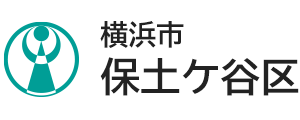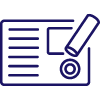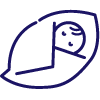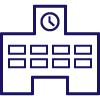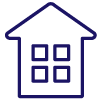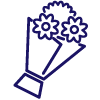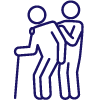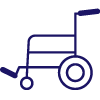- Yokohama-shi Top Page
- Hodogaya Ward Top Page
- Health, Medical Care and Welfare
- Health and Medical Care
- Health promotion
- Healthy trivia
- Healthy trivia "Rest Room"
Here's the text.
Healthy trivia "Rest Room"
It's a healthy trivia about rest. "trivia" is "miscellaneous matters, knowledge, and trivia." The information provided here is supervised by Health and Welfare Center Hodogaya, referring to information from public institutions such as the Ministry of Health, Labour and Welfare.
Last Updated September 30, 2020
Click here for health trivia about resting.
1 Is it true that sleep and lifestyle-related diseases are related? !
2 Is it true that bathing at about 40 ° C is effective for a good sleep? !
3 The sleep time required for one night at 45 years old is 6.5 hours? !
4 The human body rhythm really is about 25 hours!
Is it true that sleeping is not effective in recovering from fatigue?
6 When sleep is shallow, do you really want to sleep and wake up? !
7 Is it true that alcohol instead of sleeping pills is ineffective?
8 Is it true that too much look at your smartphone or computer before going to bed affects sleep? !
1 Is it true that sleep and lifestyle-related diseases are related? !
It's true.
Don't you breathe when you are sleeping? ? Sleep apnea syndrome, in which breathing becomes poor during sleep and stops breathing, increases the risk of high blood pressure, diabetes, arrhythmia, stroke, ischemic heart disease, periodontal disease, etc. without treatment. Sleep apnea syndrome develops or becomes more severe due to overweight or obesity. To prevent sleep apnea syndrome, it is important not to be obese.
Reference: Ministry of Health, Labour and Welfare Health Bureau Sleep Guidelines for Health Promotion 2014 (outside site)
2 Is it true that bathing at about 40 ° C is effective for a good sleep? !
It's true.
Sleep and body temperature changes are closely related. Changes in body temperature due to bathing have the effect of improving sleep, such as promoting sleepiness and increasing deep sleep. The effect of bathing at a hot water temperature that is not too high at about 40 ° C at the appropriate time is as follows.
① Spiritual relaxation
② Lightly rises in body temperature and subsequent heat dissipation becomes active, increasing deep sleep around 90 minutes after sleeping.
Alcohol temporarily promotes sleep asleep, but increases premature awakening, hinders sleep, and slows sleep.
Reference: Ministry of Health, Labour and Welfare Health Bureau Sleep Guidelines for Health Promotion 2014 (outside site)
3 The sleep time required for one night at 45 years old is 6.5 hours? !
It's true.
The time you can actually sleep at night (= the amount of sleep per night) gradually decreases after adulthood. Night sleep is until the early teens: 8 hours or more, 25 years old: Approx. 7 hours, 45 years old: About 6.5 hours, 65 years old: About 6 hours, ※People who are healthy and not sick will decrease at a rate of about 30 minutes every 20 years. (There are individual differences.)
Lack of sleep deteriorates attention and work efficiency, and lower productivity. In addition, lack of sleep leads to physical complaints, anxiety, depression, and delusion of acknowledgement functions, which are important for maintaining mental health, such as emotional regulation, constructive thinking, and memory ability. Lack of sleep increases the amount of secretion of the stress hormone, corticosol.
Reference: Ministry of Health, Labour and Welfare Health Bureau Sleep Guidelines for Health Promotion 2014 (outside site)
4 The human body rhythm really is about 25 hours!
It's true.
The body clock, which controls the timing of awakening and sleep, resets the day's light immediately after waking up, and ticks the day. It's about 25 hours. Not significantly shifting the time you wake up even on holidays, it leads to good sleep.
Reference: Ministry of Health, Labour and Welfare Health Bureau Sleep Guidelines for Health Promotion 2014 (outside site)
Is it true that sleeping is not effective in recovering from fatigue?
It's true.
Beware of sleeping is not effective in recovering from fatigue because the rhythm of life is disrupted! ! If you are sleeping until a late time on a holiday to eliminate sleep lack of sleep, your body clock is not adjusted by light and your life will become night-shaped, making it difficult to sleep at night the day before work and poor wake up in the morning after the holiday. Leads to
Lack of sleep reduces the metabolic activity of the frontal Maeno and the peripheral system, which controls emotional regulation and performance, and increases the amount of stress hormone secretion.
If you are unable to secure the necessary sleep time at night due to work or life reasons, taking a short nap of less than 30 minutes early in the afternoon is effective in improving sleepiness due to sleepiness.
Reference: Ministry of Health, Labour and Welfare Health Bureau Sleep Guidelines for Health Promotion 2014 (outside site)
6 When sleep is shallow, do you really want to sleep and wake up? !
It's true.
If you try to sleep without wanting to sleep, it will increase tension and make it harder to sleep. The standard of sleep time required by the body is "6 hours or more and less than 8 hours." If you spend more time on bed longer than necessary, your sleep gradually becomes shallower and wake up in the middle of night. To adjust the body rhythm, take a bath in the sunshine and reset your body clock as soon as you wake up late.
Reference: Ministry of Health, Labour and Welfare Health Bureau Sleep Guidelines for Health Promotion 2014 (outside site)
7 Is it true that alcohol instead of sleeping pills is ineffective?
It's true.
Drinking alcohol has been shown to make drowsiness in the short term. On the other hand, drinking reduces remn sleep in the first half of sleep, and increases the level of sleep, which is shallow non-relem sleep in the entire sleep, especially in the second half of sleep. Drinking is not appropriate to improve the quality of sleep.
Reference: Ministry of Health, Labour and Welfare Health Bureau Sleep Guidelines for Health Promotion 2014 (outside site)
8 Is it true that too much look at your smartphone or computer before going to bed affects sleep? !
It's true.
After entering the bed, you will be enthusiastic about your mobile phone, e-mail, games, etc., and will stimulate light for a long time before going to bed, stimulating awakening.
In particular, melatonin, a hormone that promotes sleeps, suppresses secretion when exposed to bright light.
Let's refrain from an hour before entering the floor.
Reference: Ministry of Health, Labour and Welfare Health Bureau Sleep Guidelines for Health Promotion 2014 (outside site)
Please take a look at it.
For inquiries to this page
Hodogaya Ward Health and Welfare Division Health Promotion Section
Phone: 045‐334‐6344
Phone: 045‐334‐6344
Fax: 045‐333-6309
Email address: ho-kenkou@city.yokohama.jp
Page ID: 484-588-720
